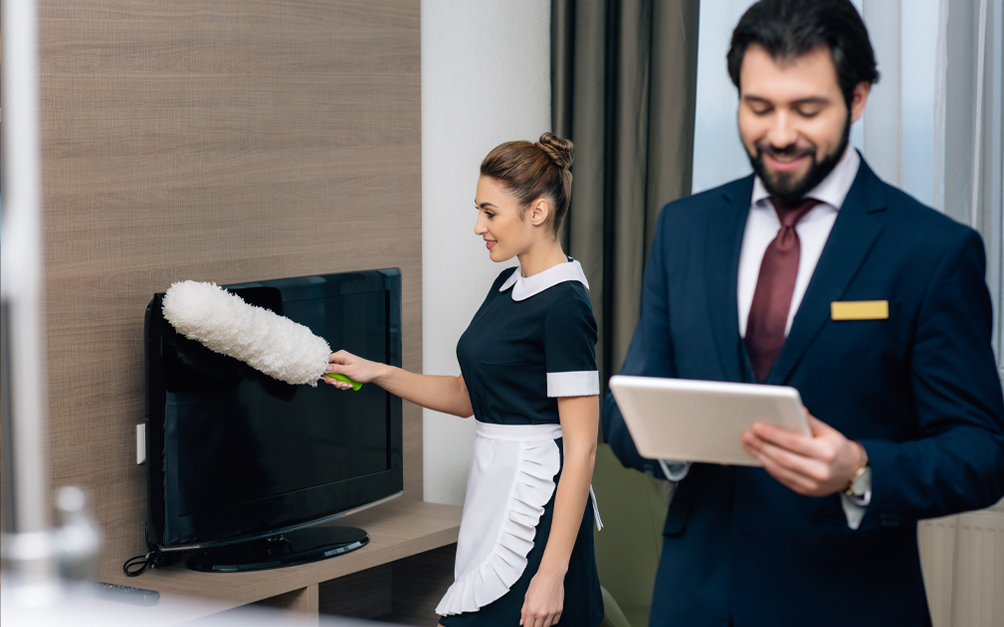
- Hudini
AI can be hotel staff’s best friend
In hospitality, AI and human personnel aren’t entangled in an either-or relationship. Instead, their roles are complementary. AI can empower hotel staff with data-backed insights that help them improve services and sales; it can also take on more rudimentary yet time-consuming tasks, giving staff the time and mindspace to engage in work that requires their skill sets, such as guest relations.
In fact, AI’s role is evolving to become one of staff empowerment. For example, hotels are turning to AI-enabled language learning tools to help staff polish their foreign language skills, which goes a long way in making international guests feel comfortable. Sales teams are being equipped with AI-enabled voice controlled speakers, which listen in on calls and pitch in to help sales reps.
Research has found that 86% of hoteliers believe that AI integration has improved employee satisfaction. By integrating AI into hotel operations, staff can work more efficiently, provide better service and personalize every stay. Hotels are deploying AI-based tools across departments from marketing to maintenance and the results have been encouraging.
Guest relations: AI-powered chatbots and virtual assistants can handle basic yet repetitive queries 24/7, freeing up staff for more important tasks. AI also analyzes guest data, such as reviews and preferences, within seconds and offers insights that staff can use to recommend personalized upgrades and activities.
Marketing: By analyzing reams of data, AI tools can uncover new opportunities and segments, which marketing teams can then leverage to improve revenue. The team can also create marketing campaigns, course-correct performance and hyper-target potential guests to deliver better results.
Operations & maintenance: AI that’s linked to IoT sensors can predict when systems will require repairs, helping maintenance teams avert any breakdowns and service disruptions. It can also flag problem areas, optimize digital guest journeys and manage energy usage to trim bills and boost sustainability.
Revenue management: AI-powered tools can study historical trends, current factors and competitor rates to arrive at the most attractive room rates for hotels. These dynamic pricing strategies help revenue management teams maximize profits.
Inventory management: Using AI, supply teams can keep tabs on what needs to be restocked, when and in what quantities. This can reduce expenses and wastage significantly. AI can also zero in on which suppliers are the most efficient and cost-effective, helping staff further optimize supply.
Human resources: Training modules and employee evaluations are being boosted with AI-powered analytical tools to measure performance and guide each team member towards improvement. Meanwhile, AI and Augmented Reality are being combined to create realistic scenarios that make training modules more immersive and engaging.
This is just an inkling of how hotels are deploying AI, and we’ve explored this topic in greater detail in an earlier blog. The aftermath of the pandemic was a staff shortage that hotels are still struggling to address. Recently, the American Hotel & Lodging Association (AHLA) reported that 82% of hotels in the US are facing staff shortages. It’s no surprise then that hoteliers are depending on AI to lighten workloads and automate tasks without impairing guest experience. They’re also using AI to streamline staff scheduling, making the best use of limited personnel.
Training & transitioning
While AI can improve staff productivity and job satisfaction, it’s unlikely that most personnel will take to it naturally. Hotels must undertake training programs to upskill their teams and simultaneously unlock the potential of AI. The first step will be reducing anxiety about AI replacing humans at the workplace. Hoteliers will have to demonstrate how AI can play a supportive role and only then train staff to use the tools to their advantage.
Ultimately, hospitality is driven by enhancing human interaction and experiences. That’s not going to change anytime soon. Once hotels strike the right balance between the roles of AI and its people, staff won’t just become better at their jobs, but also happier.
Engage, Elevate.

Join our mailing list
Enter your email address


